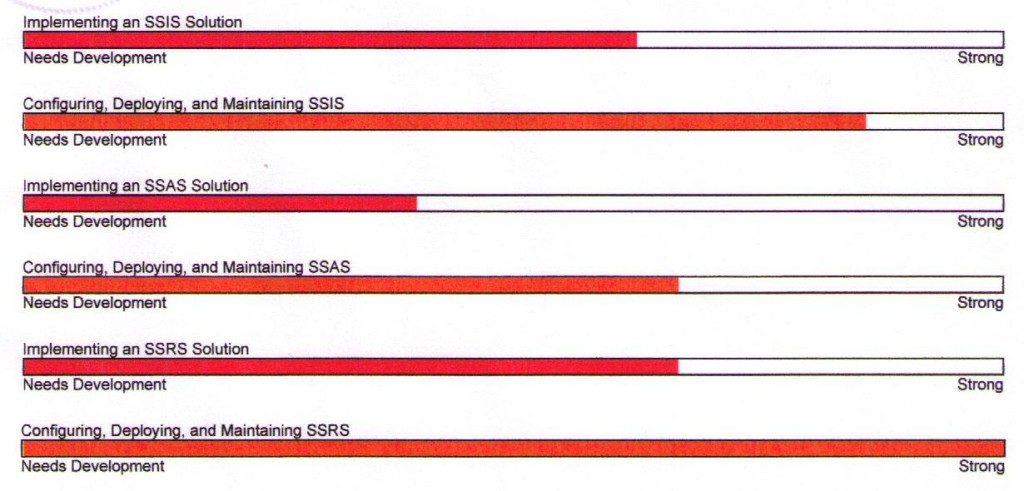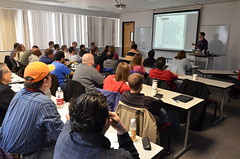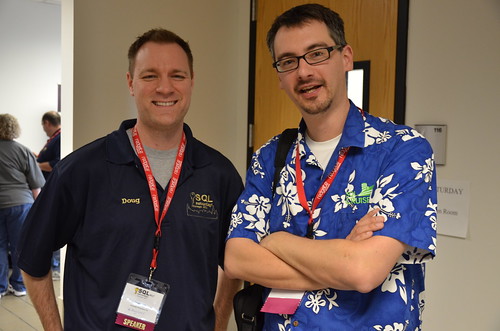This review is part one of a twelve-part series of book reviews I have committed to writing over the next twelve months (read the list and the reasons for making it here: “What Gets Measured Gets Done“). As my list of responsibilities grow at work and at home, I need to improve my organizational methods in order to keep up. Plus, honestly, I’m not a highly organized person. I tend to do what is on my mind at any one moment. I remember to do pretty much everything (and certainly everything that’s important) but I don’t have much structure to support my train-of-thought methods. Getting Things Done by David Allen aimed to do two things: make me more productive, and take the stress out of the process.
I checked out the book from the public library; I rarely purchase non-technical books anymore — most are available somewhere in the Denver metro area. I also bought the unabridged audio book to listen to during my commute. The audio book is read by the author, who has an accent I can’t quite peg. I chuckle whenever I hear him stress the ending “r” in “tickler” or “labeler”. There’s enough content in the book that to fully absorb it, I had to read it twice and listen to the audio book four or five times.
At 259 pages, it is at times a tough and tedious read, if only because there are frequently new concepts, diagrams, and systems within systems being introduced. For example, in chapter nine, he introduces three levels of thinking to go through in order to decide what action is best to take:
- The Four-Criteria Model for Choosing Actions in the Moment
- The Threefold Model for Evaluating Daily Work
- The Six-Level Model for Reviewing Your Own Work.
These levels are hierarchical, meaning every task you undertake will pass through each of the three models before you start it. (One exception, I think, is the tasks you can hammer out in two minutes or less. Allen advocates simply doing them is simpler than trying to plan them.)
What I got out of the book
I read this book with the willingness to completely overhaul my time management habits. I can’t say I’ve done that yet, but I have made some improvements:
- I reorganized my office folders using manila folders, and one per hanging folder. Already I have had an easier time filing and finding papers. (Note: I went against Allen’s recommendation to do away with hanging folders. I find without them the manila folders either slouch or are too tightly stuffed inside the drawer, especially when the folders are fat.)
(True story: I once worked with someone who called them “vanilla folders”.) - I use the middle strata of his six-level model to evaluate tasks. I’m a very future-oriented person, and when I project out it’s usually in increments of years or even decades. I have a good idea where I want to be in ten years, but I hadn’t been connecting tasks with, say, areas of responsibility — what Allen calls “20,000 feet”.
- I stopped making piles. My desk was only sparsely covered, but now there’s not much beyond the usual supplies and decorations. Paper doesn’t rest comfortably in processing purgatory the way it used to. By filing papers away and trusting my lists to serve as the sole reminder of actions involving those papers, I don’t feel the mental jab I used to whenever I’d see the pile.
Am I stress-free now? Of course not, but I do feel more comfortable knowing that I’ve tracked everything on a list. One of the chief aims of the book is to create a “mind like water” by storing projects and to-do’s on paper, not in your mind. I think my mind has gone from molasses to 5W-30 — a subtle improvement. Accounting for all my tasks doesn’t preclude my concern about getting them done.
Am I closer to my goal?
I read this book to improve one of my weakest links — organization. I am definitely better off for having read it, and I suspect I’ll realize more benefits as I continue implementing Allen’s methods. Some who have adopted these methods claim it has given them a new-found freedom. I don’t find the system’s effects to be so profound, but nor was I overwhelmed by e-mail and meetings. The people most likely to gain (or likely to gain the most) are those drowning in the pool where correspondence and responsibility meet.
Whether you’re in dire need of a new system of organization or merely interested in some productivity tips, give Getting Things Done a try. I suggest borrowing it from the public library; it’s a popular book and most branches will have a copy or two. You’re likely to mine a nugget or two that will make getting things done a little easier.



